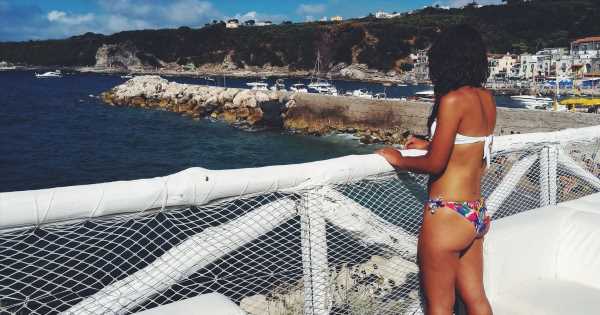Holiday laws for Brits from France’s speedos rule to Greece’s ban on high heels
When heading abroad for holidays, most of us know want to avoid getting into trouble and having a trip ruined because of a hefty fine.
We dutifully check that we're abiding by the most up-to-date travel advice, from Covid masks on public transport to steering clear of becoming the boozy 'Brits abroad'.
But, some unusual rules around the world can land UK holidaymakers with a fine if they’re found to have broken them – even if this is accidental.
READ MORE: Tourists in Italy could be fined thousands for breaking these simple rules
After all, nobody expects to get told off for wearing swimming trunks to a pool or dancing in the wrong place.
We take a look at six lesser-known laws in hotspots such as France, Italy and Greece – check them out below.
1. Avoid high heels in Greece
OK, so you don’t have to avoid your favourite glam stilettos everywhere on your holiday to Greece or its islands.
But, you should aim to wear flat shoes when touring ancient monuments.
By law, it is forbidden to wear high heels to the Acropolis, Odeon of Herodes Atticus in Athens and the Epidaurus Theatre in the Peloponnese region.
Eleni Korka, Director of Greek Prehistoric and Cultural Antiquities said, "Female visitors must wear shoes that do not wound the monuments.
“These monuments have a skin that suffers and people must realise that."
The ban was introduced in 2009 and stands to this day.
2. Swimming trunks banned in France
A little known law in France means that swimmers must wear a Speedo when in a public swimming pool. Anyone who’s ever been to the beach or a lido in our neighbouring country may have been surprised to see so many men wearing the skin-tight revealing clothing, but it seems it's a civic duty.
Thanks to the the 1903 law, all men and boys of all ages must wear a Speedo to swim in public pools.
Emmanuel Dormois, a head pool attendant in Paris's 11th arrondissement previously told the Guardian that this was because of hygiene.
He explained: "Hygiene. Small, tight trunks can only be used for swimming. Bermudas or bigger swimming shorts can be worn elsewhere all day, so could bring in sand, dust or other matter, disturbing the water quality.
"By banning them outright, we're not forced to stand there measuring what can be defined as swimming shorts. I accept that some men feel very ill at ease wearing small trunks, but others don't mind."
3. Don’t feed pigeons in Venice
Since 2008 it has been illegal to sell or distribute grain to feed birds in Venice. In fact, any tourists found to be feeding the city’s pigeons could be handed a 50 euro fine.
The rule is believed to have been put in place because the birds peck small gaps in the marble statues, buildings and facades that fill Venice’s streets.
Cleaning up and repairing the damage caused to the architecture by pigeons was costing taxpayers a fortune, reports Reuters.
4. Wearing a bikini in Sorrento
The Italian town on the Amalfi coast banned swimwear on its streets earlier this year.
The Italian hotspot has announced a new ban on bikinis – and those who break the rules could be risking fines of up to €500 (approximately £425).
The rules will also apply to tourists who walk around topless.
The good news is that you're not going to get fined if you're sitting poolside or hanging out at a beach club. Instead, the rules will apply when people are out and about on the streets of Sorrento, whether walking around the shops or heading to a restaurant.
5. Dancing in an unlicensed venue in Sweden
Flight attendant explains what passengers 'should never eat or drink' on planes
'Spontaneous dancing' in Sweden at a venue which does not have a 'dance permit' could land the venue owner in trouble.
Unless you know the bar or club has a permit it is against the law for you to dance.
The law was introduced in the 1930s and has faced multiple motions to dismiss it, but as recently as 2020 people were being fined for breaking the Footloose-style rule.
The Swedish parliament formally voted to delete the archaic article of the law, reports the Afrinik, but there have been claims that it's still being enforced.
6. Plastic plates, cups and straws in Capri
In 2019, the stunning Italian island of Capri – just off the Amalfi coast – banned all single-use plastics that are not biodegradable.
The natural beauty of the area was being compromised as it struggled with the rubbish left by its 2.3million annual visitors.
Tourists will face up to a €500 fine if they’re caught using disposable plastic cups, bags, plates or cutlery on the island.
So if you’re planning a day trip or beach picnic be aware that you should take biodegradable items or metal or stoneware items to avoid a whopping fee.
READ NEXT:
Flight attendant shares big mistake most passengers make when on plane
Spain, Greece, Italy and Portugal to charge UK tourists to visit – but it's delayed
Do you need a booster to travel to France? Latest travel rules for Brits
Is it illegal to have sex on a plane? Travel experts answer biggest holiday questions
Source: Read Full Article










